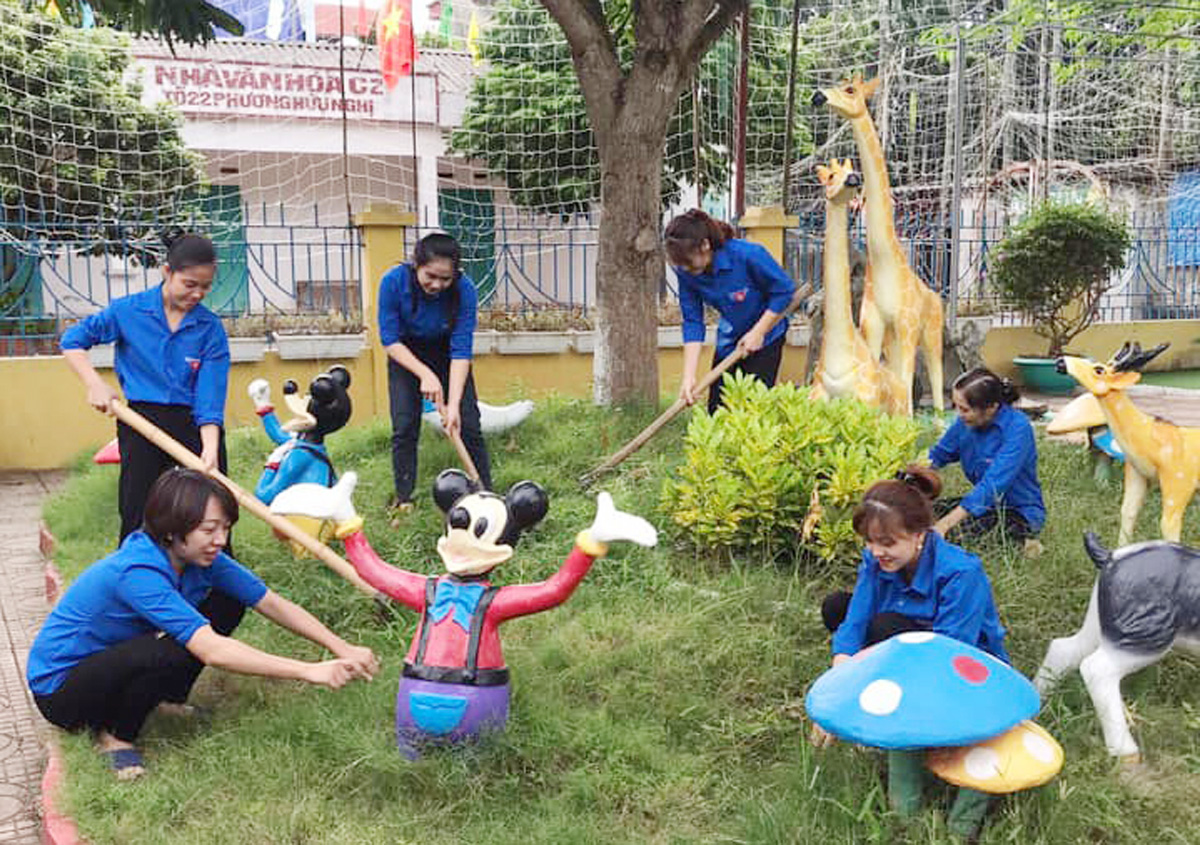


 The members of the
Youth Communist Union of Huu Nghi ward (Hoa Binh city) coming out to clean the
environment, creating the beautiful landscapes for the cultural houses in the
residential areas.
The members of the
Youth Communist Union of Huu Nghi ward (Hoa Binh city) coming out to clean the
environment, creating the beautiful landscapes for the cultural houses in the
residential areas.
From the desire to build villages, hamlets and residential areas meeting the cultural standards, the Party committees, the authorities and the mass organizations have been promoting propaganda and mobilization, and the people have actively responded to the activities of mutual help and assistance each other, connecting the love of the village and the residential areas. One of the criteria meeting the standards of cultural villages, hamlets and residential areas is that the economic life of the people is stable and is gradually developing. Specifically, people at the working age have jobs with the stable income and the income per capita is higher than the average level of the province or the district, the rate of the poor and near-poor households is lower than the general average; the proportion of the households with permanent houses is higher than the general average, with no dilapidated houses ..
To achieve this result, the humanitarian and charity movements at the grassroots levels have been promoted. Accordingly, it has attracted a large number of people from all classes, contributing to creating a foundation for people in difficult circumstances to improve their lives. As a result, over the past time, 341 poor households have been supported for housing construction from the Fund "For the Poor” and the support from individuals, businesses, and philanthropists. Through the strict implementation steps with the supervision of the community, it has ensured that 100% of the poor are granted health insurance cards, receiving free medical examination and treatment, 100% of the pupils who are the children of the poor households are exempted from the tuition fees. In terms of implementing the criteria of villages, hamlets, cultural residential areas, the movement of developing farm economy, service business, and craft villages has been strengthened. On average, about 15,200 employees are provided jobs. The unemployment rate decreased to 3.7%, the rate of the poor households decreased to 11.36% in 2019. It is estimated that by the end of 2020, the rate of poor households will decrease to 8.56%.
Implementing the criteria for building a healthy and rich cultural and spiritual life, on the basis of the State support capital, the people have been actively contributing the fund and working days to step by step complete the construction of the institutional culture. Up to now, in the whole province there have been 1,443 out of 1,482 cultural houses of the villages, the hamlets and the residential areas, reaching 97.3%, of which, there are 607 cultural houses of the hamlets and the residential areas meeting the standards of the Ministry of Culture, Sports and Tourism. 109 out of the 131 communes have their cultural houses, reaching 83%, of which, 88 commune cultural houses have met the prescribed standards. There are 103 sports zones in the communes, the wards and the towns. 10 out of the 10 districts and the city have the cultural houses, reaching 100%. There are 131 bookcases of the communes, the wards and the towns and there 131 the communal post-cultural sites. There are 10 district-level mobile communication teams, 1,482 groups of cultural and propaganda teams in the villages, the hamlets, and the residential groups operating regularly.
With the specific programs and activities that are suitable with the reality, the movement of building the "cultural villages, hamlets and groups” has created sharp highlights. In 2000, in the whole province there were 343 out of the 1,577 cultural villages, reaching 21.75%.In 2010 there were 1,412 out of the 2,066 cultural villages, reaching 68.3%; by 2019, there were 1,264 out of the 1,482 cultural villages, reaching 85.2%. The movement of building "Cultural villages and residential groups” have in fact contributed effectively to the roadmap to improve the material and spiritual life of the people, accelerating the process of building the new rural area, a civilized city in the area.